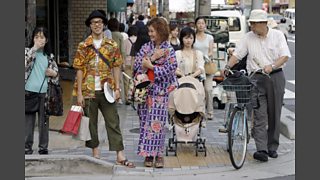Japan's Never-Ending War
Rana Mitter visits Tokyo to talk to directors, critics and students about how Japan remembers World War Two today through its movies, and how that perspective differs from China's.
Rana Mitter visits Tokyo to talk to directors, critics and students about how today's Japan tells itself the story of World War Two through its movies.
In Europe, the War is history, but in East Asia it's still current affairs. The way the War is remembered has deep resonance, even as disagreement over what happened persists.
So Rana explores how recent Japanese war movies have focused on the suffering of Japanese civilians in the late stages of the war, such as Arai Haruhiko's THIS COUNTRY'S SKY and Katabuchi Sunao's blockbuster anime IN THIS CORNER OF THE WORLD.
He finds out how there has also been something of a rise in movies which, for some at least, are seen as venerating the sacrifice of the Japanese armed forces, including the kamikaze pilots, such as FOR THOSE WE LOVE and the huge hit THE ETERNAL ZERO. Though, as Rana discovers, this is a contentious question, as some read THE ETERNAL ZERO as an anti-war film.
Rana talks to two directors whose recent war movies express their fears that Japan may be heading back towards a more bellicose mindset. Tsukamoto Shinya explains the warning he wants his brutal indy hit SHADOWS ON THE PLAIN to deliver to young Japanese viewers, who are far removed from direct memories of the horrors of war. And Harada Masato tells Rana what drove him to make THE EMPEROR IN AUGUST - a sympathetic take on Hirohito's role in the Japanese decision to surrender. As Harada puts it, the story shows how much harder it is to end a war than to start one.
Rana also talks to critics and historians, and meets a new generation of movie-goers to find out what they see in these movies. And he explores how China is dramatizing the war on screen. He talks to the director and the Chinese-American executive co-producer of a new documentary, charting the devastating impact of Japanese military violence in the Chinese city of Nanjing in 1937.
Finally, Rana asks, can Japanese and Chinese perspectives on the war be reconciled? And can movies encourage mutual understanding?
With: Arai Haruhiko, Katabuchi Sunao, Harada Masato, Tsukamoto Shinya, Jeff Kingston, Mark Schilling, Jasper Sharp, Akio Takahara, Cecilia Chan and Vanessa Roth
PRODUCER: PHIL TINLINE.
Last on
More episodes
Previous
Broadcasts
- Sun 29 Apr 2018 18:45�鶹������ҳ��� Radio 3
- Fri 16 Aug 2019 22:00�鶹������ҳ��� Radio 3
Featured in...
![]()
Japanese Culture—Free Thinking
From the Tale of Genjii to Godzilla, Kenzaburo Oe to Yoko Tawada …
![]()
Arts
Creativity, performance, debate
What was really wrong with Beethoven?
Classical music in a strongman's Russia – has anything changed since Stalin's day?
What composer Gabriel Prokofiev and I found in Putin's Moscow...
Six Secret Smuggled Books
Six classic works of literature we wouldn't have read if they hadn't been smuggled...
Grid
Seven images inspired by the grid
World Music collector, Sir David Attenborough
The field recordings Attenborough of music performances around the world.




